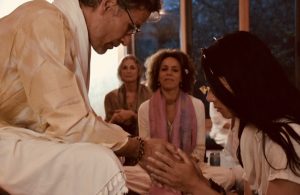In conversation with Igor Kufayev:
Question: In spiritual communities in the West, we often come across the opinion that it is not necessary to have an external teacher or guru on our spiritual journey, because the “inner teacher” is considered to be the guiding light, whereas the relationship between teacher and student in India is considered very important — there is even the premise that this is necessary in order to complete our journey of Self-realization. Could you shed some light on this unique relationship and its significance?
A Delicate and Controversial Topic – Individual Freedom and The Concept of Democracy
It’s a very delicate topic, mainly because in our day and age the notion of having a teacher is very often associated with certain undesirable consequences, which otherwise — from the perspective of certain more traditional understandings — are paramount to the process. In the West today, value is being placed on the individual. And this is in accord with the set of shared values in our culture, where the value is in the individual, the individual therefore is that highest pinnacle. When we speak of democratic societies, we speak of that which is the ideal climate for the expression of that individuality. The question you are asking is not limited to existential quest — it’s a much broader question. It’s a cultural question. It’s a question of what we value in our civilization currently — what set of values we agreed upon and exalted above other perspectives. That value is primarily understood or expressed as individual freedom. The whole longing of Western civilization is that longing for individual freedom. The very idea of the demos (the Greek term for ‘people’) is that it can give expression to individuality as a sum total of the wish or the will of the people. But what it meant in ancient Greece, and what it means today are perhaps very different notions altogether. We can argue that the term demos — when it was born in ancient Greece — exemplified something quite different from what we speak of as democracy, when we speak of it in terms of the political attitude of certain ideologies and consensus reality. The notion of democracy is not as straightforward as it may seem, even in Ancient Greece the aspiration towards democratic societies was accompanied by lapses into dictatorship and tyranny.
As a footnote, the idea of demos evolved in Ancient Greece, around the 5th century BCE. This coincided with the unification of certain ideas in this particular part of the world, under the leadership of Athens, where perhaps for the first time certain rhetoric and philosophical aspirations of its greatest beings were put into practice, for creating a social structure which would correspond to these ideas. We are speaking of the time of Plato’s Republic, universally acclaimed to be the philosopher’s greatest work, and Pericles’ Democracy, which defined the highest value of a social order yet-to-be-experienced.
The clash between the two perspectives – Plato’s (essentially) anti-democratic view of the ‘philosopher king’ and the Periclean concept of freedom and democracy – represents the centuries-long dilemma of what constitutes the highest human aspiration, and remains unresolved as ever.
The Golden Age of the Classical period of Ancient Greece didn’t last long. It was a very short window of time. As we know, Pericles was locked in prison as he was still working on the building of the Acropolis (he actually conducted the building instructions while behind bars). The very democracy that he spoke of ended there and then! Autocracy then came, and ever since, democracy remained an ideal in the minds of those trying to implement it, as well as the tool of political manipulation. Let’s face it, today ‘democracy’ is that word which we use when we send our tanks and airplanes to bomb another country! So this is how far we have advanced in terms of our understanding of that term.
However, before democracy took hold of the collective imagination, there were other perspectives in Ancient Greece, exemplified by Plato’s idealism and philosopher-sages who came before him, which were closer in their exegesis to that of the ancient mystics of various traditions in various parts of the world. Why are we speaking about all this now, in relation to the concept of the teacher or the guru? Because the term guru, as it is known in Sanskrit, represents a multitude of functions, from instructions and initiations into the subtlety of certain crafts and arts — in other words one can have a guru who teaches sitar or violin. And from the cultural perspective, the guru who teaches you sitar in India is not necessarily the same as the guru who teaches you violin in Berkeley. Because, whereas in the understanding of the learning process, it presupposes the giving and acquiring of certain skills, but more importantly, a transmission of certain aspects which go beyond mere technique… which has little to do with skills. But rather with that, dare I say, a sacred attitude which the teacher embodies with respect to any given sphere, that which is then passed on from heart-to-heart — which in turn re-activates the innate compass, or serves as the lighthouse to navigate the deeper waters of an individual psyche.

These are the main differences — call them cultural or whatever you prefer. In other words, before we even begin to speak about the role, necessity, or how to go without, I’d like us to paint the landscape where a broader understanding can unfold. So that we have this additional perspective on why in today’s spiritual circles, this opinion — that there is no need for an external guide — is widespread is because in the West there are very different cultural sentiments— which in fact are becoming commonplace globally. Furthermore, in the West, we are affected by that widely accepted notion, that, ‘As long as I am paying for it, it is mine.’ In other words, anything can be acquired, anything can be consumed, because we live in the fast-food culture — even when it comes to matters of soul. In the culture where fast-food is often our regimen when it comes to spiritual nourishment, the last thing we want is the guru. Why? Because the guru will complicate things. At McDonalds you get your burger as big and for as little as money can buy, and it’s a ‘do it yourself’ kind of deal — filled with all the ingredients that our taste buds learned to be seduced by.
Yet, we don’t want to be unfair or categorical about this topic, and there are many examples to the contrary, where we have seen amazing nuances between teacher and student. Richard Alpert’s (Ram Dass) autobiography of his relationship with Neem Karoli Baba is a fitting example, which transcends culturally-defined boundaries. Conversely we have seen all-too-easily-accepted, never-truly-questioned, and as a result, superficial connections between teacher and student. For example, in India where touching of any given mahatma’s feet is simply part of the culture, this doesn’t mean a great act of devotion took place. So let’s not fool ourselves, that somehow someone is culturally in a more advantageous situation.
The Effect of the Current Age on the Teacher-Student Relationship
The West has its own limitations to overcome — just like the East has its own limitations to overcome — when it comes to that sacred relationship between teacher and student. Also, this is because we live in the time of Kali Yuga — at a time when the field of action (dharma) is violated — and it is obvious that this relationship is violated, because it’s just part of all our interactions. Just as every relationship is affected, during Kali Yuga it is more so than at other times. There were many times when this beautiful-in-its-essence-connection has been subjected to abuses on both sides. So that is what we are dealing with here. That’s what I meant when I said it is a delicate topic.

As to the specifics in question, it is equally true that there is an inner guide, or ‘inner guru.’ In fact, there is no way to recognize the outer guru, unless that inner truth has already being revealed within to a certain degree. In other words, it is usually those who are already very advanced, that are able to find this connection in the outer world. And likewise, it’s true that those who have not, would simply dismiss and deny the need for that, because it is not there in the first place — because that need cannot arise on its own, just out of pragmatic necessity.
Ultimately speaking, it could be said that anything that we experience on the outside could be said to be our projection — and that would include the one who is being perceived in the role of the teacher. And it is precisely that which makes the role of the guru significant, because this projection is two-fold. While everything that we perceive belongs to the phenomenology of subject-object and the relationship between — as exemplified in the Vedic tradition as the togetherness of seer, seeing, and seen — is also what gives structural dynamics to all experiences. So it is precisely because of that, the one who has been put in a position of the outer guide becomes the mirror, where we can recognize with greater clarity our own process — and along with that our limitations. And of course, that also includes advancement.
The Teacher safeguards the Spiritual Journey
When it comes to the real spiritual work, the teacher-student dynamics are often subconsciously repulsed, as that relationship — depending on how uncompromising this or that perspective — would sooner or later require the annihilation of that, which is spoken of from the Perennial perspective as ‘non-self.’ And there are various traditions, and ways for how that work is being done, but the inner mechanics of this (process), are often very similar. It is the teacher here who will reflect precisely what needs to be reflected.

And providing the teacher is the real deal, then this process will be much more steadfast, without unnecessary pitfalls and all that accompanies that — and this process is essentially unthinkable without pitfalls. So the teacher simply safeguards the process itself. And that’s why you can find so many poetic lines out there, in so many cultures.
One immediately comes to mind from Jalāl ad-Dīn Rūmī, ‘Whoever enters the Way without a guide will take a hundred years to travel a two-day journey.’ And it is in that structure of seer, seeing, and seen, that the very relationship between the teacher and student also presents a visceral possibility for breakthroughs — which, if one is only opting for the teacher within, it would be so much harder to achieve, because that aspect within is an abstract aspect, filtered through the agendas of egocentricity. Yes, one can speak to one’s reflection in a mirror, and let’s see how much guidance comes from that! How much of that mirroring-wisdom is going to be reflected back to tell us what we don’t want to hear? That is another question altogether.
That Realm of the Transmission of Grace
But these are not the only dynamics. There are subtler dimensions to the relationship between teacher and student, subtler dimensions which belong to the realm of the transmission of spiritual force — transmission of grace. And I don’t know if this belongs to this conversation, but it is precisely in that where the most profound changes take place, because the teacher here literally acts as a conduit of that force — of that power which is capable of providing the required charge, where the power of grace manifests within. Yes, we speak of the transmission of grace, we speak of that passing on… but this is a very intricate thing, because we can misunderstand the nature of this process — as often is the case in my own experience of working with seekers from all walks of life.
This takes us into the dynamics of awakening itself. What could be of value to mention here, is that just as the presence of the teacher provides a framework, where the possibility of falling out of this process becomes less obvious, it’s also true that it safeguards the process itself, because of what is known as ‘transference.’ Consciousness, as it were, mimics here, especially when we speak of darshan or satsang — ‘being in the presence of a master.’ This is where our awareness aligns through that which is being perceived, for being in the presence of someone who has realised the essence is essentially partaking in our own reality. We’re not taking part in someone’s reality — it’s always our reality.

Dispelling the Misconception that the Teacher usurps our Freedom
Perhaps another note here, as a concluding remark. It would be good to dispel the misconception that the teacher desires, or requires the unequivocal annihilation of one’s will, in order for this process to be successful. This is a misconception on two accounts. To begin with, in order for that to happen, one has to be in possession of one’s will. First, we need to understand that the concept of our own free will is the greatest illusion — or rather delusion — that we hold onto so dearly! And that of course, is rooted in the current culture we live in, especially in the secular culture where our most highly cherished possession is to be able to act in accord with our free will — and that goes hand-in-hand with what we have spoken of right from the beginning. The greatest value is being placed on that which is the expression of individuality, and it is that which we are afraid will be usurped. We are afraid that that freedom of self-expression is being taken away from us. This in turn, presents the greatest predicament, and the greatest area for understanding, because the difficulty simply arises from misunderstanding of what comprises the true nature of freedom. It’s not that we are asked to give up will — we cannot give up that which we do not own to begin with — but even if we are to imagine for a moment, or presuppose that there is indeed a will of our own, it’s not by giving it up; it is essentially understood in terms of taking greater responsibility for one’s own affairs, for one’s evolution. That’s what this really represents.
In other words, it’s totally the opposite of what most of us think. Having a teacher is a responsible act, when one is not afraid to lose oneself, because one is evolved enough psychologically.
It’s the one who is not evolved as an individual, who is in danger of losing that which is in the formative stages. And when that happens, very often the one who is temporarily in the position of the disciple wants to, desires, even demands, that the teacher take responsibility for that person’s life. You can almost hear: ‘Yes, I will surrender. Now you take care of me!’ This kind of surrender is more of a bargaining, and that’s why we’re all facing this predicament collectively — because our culture does not support this relationship. There’s very little understanding, and it is ridden with many examples where the undeniable power that this relationship holds has been misplaced, and now also lacks the nuances and subtleties which are necessary if one is to experience the true intimacy that this relationship avails.
Not surprisingly this, ‘Who needs a guru?’ opinion is a reflection of all these deeply hidden and seldom acknowledged fears, often masked by the pretences that we live in a different kind of time when the need for the spiritual guide is a somewhat anachronistic affair. Yet, if these fears and misconceptions were given the light of clearer perception, and if we were more educated on this [relationship], then this would not create such suspicion along with denial. With that being said, this fear is a legitimate one – there is something unnerving about this process that demands and brings about a true sense of surrender. And let us be frank about it. Even those who go DIY style, without any external guide, the terror of losing one’s control over this process is enormous. That terror of losing the framework of identity is not a trivial affair, because that which we considered ourselves to be before, as it were, is being readjusted, often in a merciless way. You know, before the optical illusion is adjusted into that which is not in a focal point of this and that… there is this fear of not knowing where we are going to land — not knowing who we are. And that is perhaps precisely where the most noble part of the teacher’s role comes in, because the teacher disperses that fear, and alleviates all this, by presenting the most direct and most immediate entrance from that which is so uncertain, to that which doesn’t require any confirmation — because it’s obvious beyond belief. It’s obvious beyond ideation, it’s just a matter of fact, it just is. But before that takes place, there is this vacillation, and wobbling goes on. This wobbling will go on until we are ready to let go of that false sense of control.
We only hope that with being on the verge of yet another breakthrough into new paradigms, propped up by all these technological advances, that somehow we won’t run into ready-made conclusions — which I do hear now being expressed aloud in the spiritual community — that the role of the master has somehow outlived itself. It’s an anachronism, that this relationship is no longer required. ‘We can do it! We can read enough, we can get enough exposure to what our essential nature is, without learning secret scriptures. It’s all out there, all this is presented — who needs the guru? Who needs the guide? Why? What for?’
Why are these kinds of slogans flying around? Because there is simple lack of understanding, that the guru is not so-and-so. Never was so and so — it’s an eternal principle. It cannot be renewed, nor can it be worn out. It’s not a thing, not an object of our perception. Even as far as the job is concerned, it’s not a fixed position, no one is ever a guru in relation to oneself — guru is always in relation to the disciple.
The true beauty of that relationship reveals itself when our heart is cultured enough to comprehend its incomprehensible essence. That is why in certain traditions, so much importance is given to this connection. Because that relationship is what truly completes even the most advanced process, the most advanced phase of awakening, and from there on it cannot be defined by intellect. More than anything, it is that which cultures the heart; it’s literally that connection with and to that universal principle — that which in Vedic and Tantric lore is spoken of as guru-chela, or in Sufism as silsila. Whatever can be said about this would always be a matter of direct experience, and no matter how advanced the coming age which is upon us, there will always be those who are given access to this wireless resonance of the Heart…
Adopted and expanded from the interview on “Kundalini, Kriyas & the Path of the Heart,” Mallorca Nov 2016
– Igor Kufayev – Oxfordshire, UK July 2018

